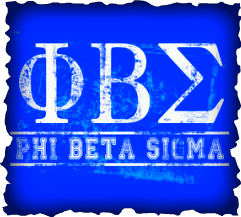The Amazing Alpha Delta Chapter blog on things from Phi Beta Sigma Fraternity Incorporated History, all the way up to present day in Sigma Land.
|
Many of the greek communities on college campuses were chartered in the early 20th century. Historically African-American chapters were not common in the world of predominantly white universities during the initial years of their founding.
The Delta chapter of Phi Beta Sigma fraternity, one of these historically African-American chapters, is an organization that was founded nationally in 1914 at Howard University and was brought to K-State in 1917 as the Delta chapter. It was the fourth chapter to be founded nationally. The chapter will be celebrating its 96th charter anniversary in April 2013. The Delta chapter was founded before the market crash of the 1920s leading into the Great Depression, before the civil rights movement and before the election of the first African-American president. This chapter has been one of the longest-running greek chapters at K-State that has not had to be rechartered off campus. “It is amazing to be a part of this fraternity and an accomplishment,” said Jeremy Scott, brotherhood chair of the Sigmas and senior in agricultural communication. “We have been around for almost 100 years. It has been a struggle for African-Americans to be able to fight for where they are today. It is an absolute blessing to be a part of this organization.” When the Sigmas first came to K-State, they owned and lived in a house at 618 Yuma Street. This is the same house Minnie Howell, the first African-American woman to graduate from K-State in 1901, grew up in and inevitably returned to once she knew her life was coming to an end. After losing that house, the national president of Phi Beta Sigma fraternity bought a house at 1020 Colorado Street. African-Americans during this time were not allowed to live north of Colorado Street. “It’s a big honor and a responsibility to be a part of this organization,” said Andre Watkins, first vice president of the Sigmas and senior in agricultural technology management. “Being a part of Sigma places in you to be an adult. Even though I like to goof off and have fun, the organization teaches you how to be an adult and when to be professional.” Delta chapter Sigmas have left a significant impact in the K-State and Manhattan communities, but also on the nation and the world. “Lift Every Voice and Sing,” also known as “The Black National Anthem,” was originally written as poem by James Weldon Johnson, a member of the Delta chapter of Phi Beta Sigma fraternity. Johnson’s brother, J. Rosamond Johnson, later put the poem to music to create the song. Pat Patton, research specialist for Hale Library, said the Sigmas created a ripple effect. When one brother would join the fraternity, the lives that brother would impact would go on for generations. “The Sigmas were so involved on campus,” Patton said. “Whether it was writing for the school paper or being involved in literary societies, the Sigmas have left such a significant impact on K-State and Manhattan.” The hill in Manhattan that has “K” and “S” on it was partially created by a Delta chapter Sigma. In 1921, engineering students plotted out the 80-foot-tall letter “K.” One of the members of that team was a member of Sigma. The letter “S” was added many years later by another group of students. Originally the hill was planned to say “KSU,” but the “U” has never been added. “Sigma has taught me that it is possible to be historic and be successful,” Watkins said. “Looking at everything my Sigma brothers have done, it allows me to want to be so much better, to do things that they did. Above all else, it makes me want to work harder.” Phi Beta Sigma is the only historically African-American fraternity that allows non-African-Americans into their organization. “When I decided to join Sigma, I had done some research on the organization before I decided to join,” said Eddie Gonzalez, second vice president of Sigma and sophomore in political science and sociology. “They were the only ones who didn’t have to change their constitution to allow non-African-Americans into their fraternity. For me being Hispanic, this fraternity welcomed me with open arms.” Gonzalez explained the bond he feels with his fraternity brothers is based on more than just the fraternity. He said Sigmas are not just members, they are not just statistics, they are family. They are brothers before anything. “The brotherhood is what brought me in,” Watkins said. “There are a lot of organizations that show brotherhood, but I felt it with this one. Sigmas continually show how important brotherhood is. The bond I felt with these men was automatic.” Watkins and Scott crossed into the fraternity in spring 2010, and Gonzalez crossed into Sigma in fall 2011. Scott said joining the fraternity has been one of the best experiences of his life. “Sigma brings positivity to its members and its communities,” Scott said. “We are ourselves. There are no stereotypes that come along with being a Sigma. Sigma doesn’t change us. We may grow as people being a part of this organization, but we never changed because of the organization.” http://www.kstatecollegian.com/2013/02/18/delta-chapter-of-phi-beta-sigma-fraternity-on-campus-for-almost-a-century/
1 Comment
|
Categories
All
|
